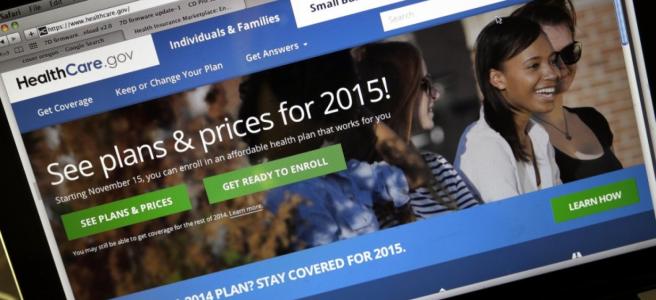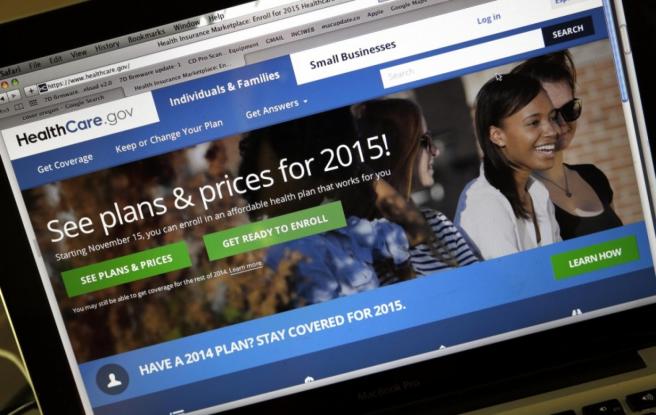
With the Obamacare enrollment window closing, HealthCare.gov activity picks up

Nearly 7.75 million people have so far signed up for 2015 health plans through HealthCare.gov, as activity on the Web site picks up just days before the end of the Affordable Care Act's second-ever enrollment period, Obama administration officials reported Wednesday.
Traffic to the federal government's health insurance Web site, which is running much more smoothly this year, was up 58 percent Wednesday morning compared to the same time last week, according to Obama administration officials overseeing the health insurance marketplaces. About 275,000 people signed up through the Web site between Jan. 31 and Feb. 6 — the most recent week of data available — making it one of the busiest enrollment weeks in the past two months.
"The enrollment experience between this year and last year is pretty dramatic," said Kevin Counihan, chief executive of the federal health insurance exchanges, on a press call Wednesday.
The enrollment period is scheduled to end Sunday, about three weeks before the Supreme Court will hear oral arguments in a lawsuit challenging the insurance subsidies available through HealthCare.gov, threatening to disrupt health coverage for millions later this year.
Numbers reported by the Obama administration Wednesday included just the 37 states relying on HealthCare.gov. Officials said they've seen enrollment surges in the past week in some Southern states, including Louisiana, Texas, Mississippi and South Carolina. At least an additional 2.4 million people have also signed up for coverage through state-run exchanges set up in 13 states and the District of Columbia, according to the most recent administration data reported weeks ago.
The Obama administration has said it hopes to keep 9.1 million people enrolled in exchanges across the country in 2015, a lower target than the 12 million set by the Congressional Budget Office. Before the start of the current enrollment period, 6.7 million people were enrolled in 2014 health plans.
Administration officials said the enrollment numbers will fluctuate through the year as people drop out of coverage, become newly eligible for special enrollment periods, or find another source of coverage. About 200,000 people will soon be removed from the exchange rolls because their citizenship status couldn't be confirmed, administration officials said Wednesday.
The much smoother enrollment period comes ahead of an upcoming Supreme Court case that could inflict serious damage on the law this summer. Plaintiffs in the case, King v. Burwell, argue that the Affordable Care Act only allows citizens of states running their own exchanges to access the insurance subsidies, but the administration and ACA supporters say the law was never meant to punish states that refused to help implement the health-care law.
The administration earlier in the week estimated that the average subsidy in these federal exchange states was $268 per month, knocking about three-quarters off the average sticker price of exchange plans for those receiving financial assistance. A ruling against the Obama administration would wipe away subsidies in these states, making health coverage unaffordable for most and destabilizing the individual insurance markets.
In that scenario, the sickest patients would have the strongest incentive to remain enrolled, driving up health insurance prices and pushing healthier people out of the markets. Millions more would be exempt from the individual mandate because they would no longer have access to "affordable" coverage, as defined by the health care law. A ruling against the administration would mean 8.2 million fewer Americans with health insurance, according to estimates from the nonpartisan Robert Wood Johnson Foundation.
The administration hasn't said what measures it would take if the Supreme Court rules against the subsidies, and it's unclear whether some states would then try to set up their own exchanges to ensure their residents don't lose the financial assistance. An adverse ruling for the administration could provide an opportunity for Republican lawmakers to push for preferred reforms, but five years after the ACA's passage, they haven't agreed on how they would design their own health coverage plan.
Meanwhile, a separate analysis released Wednesday by the Avalere Health consulting firm found that some exchange health plans placed all drugs treating certain complex diseases, like HIV and cancer, on the highest-cost tier of their drug formularies. For example, about half of the 2015 exchange plans Avalere analyzed in its sample put all drugs treating multiple sclerosis, including cheaper generics, on the highest tier, potentially requiring patients to pay more out of pocket.
Patient groups have accused some health insurers of purposefully designing drug benefits in a discriminatory way to keep sicker patients from signing up for coverage. "This is clear discrimination and a violation of the Affordable Care Act," said Carl Schmid, deputy director of the AIDS Institute, in a statement.
A spokeswoman for America's Health Insurance Plans criticized the Avalere report for ignoring the price of the drugs and focusing just on "silver"-level insurance plans. These plans, the most popular sold on the exchanges, cover about 70 percent of a patient's medical costs. Consumers can purchase gold and platinum plans, which come with lower out-of-pocket costs but higher monthly premiums.
"This report ignores a fundamental barrier to patient access of prescription drugs: the unsustainable prices of these medications," said AHIP spokeswoman Clare Krusing. "Health plans offer a wide range of coverage choices, including those with lower levels of cost-sharing, so patients can choose the option that works best for their health and financial needs."
A spokesman for the Centers for Medicare and Medicaid Services, the agency overseeing HealthCare.gov, pointed out that the ACA caps out-of-pocket expenses and prohibits plans from discriminating against sick patients. The agency reviews health plans submitted by insurers before they're certified to sell on the exchanges, he said.
"We analyze plan information submitted by insurance companies to uncover discriminatory benefit designs, and work with outlier plans to update formularies so they do not discourage enrollment of consumers with specific medical conditions," CMS spokesman Aaron Albright said.


